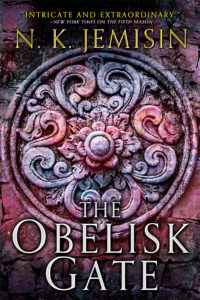Grimdark fantasy SF that makes the works of Abercrombie and Morgan seem like happy optimistic children’s fiction.
This is the second book in The Broken Earth series and it picks up right after the first book, The Fifth Season, ends. The Earth is still broken. Everyone is still going to die. And things continue to get worse.
The two main characters, Essun and Nassun, mother and daughter, both gifted with powers that make them an outcasts and slaves. They’ve been separated by circumstances and their struggles form the core of the book.
Everyone is so damaged. It’s heartbreaking. Nassun, a young girl, is warped and broken by seeing her father standing over the corpse of her younger brother. He was killed by their father when the father realized that his son had the powers to shape rocks. Nassun, in an effort to survive, travels with her father, manipulating him, developing her powers. Trying to stay alive. Expecting to die. Even when she finds sanctuary among others like herself, even when she becomes powerful in her abilities to shape forces both geological and genetic, she still knows that she will die soon. She knows that at any moment she will be killed. And all around her, the world ends.
Essun, her mother, is similarly damaged by her various pasts. She’s found refuge, temporary refuge, in an underground town. It seems nice and unbelievably, it’s run by a woman who is a member of the same slave caste as she it. But Essun knows that she can’t trust any one there, she knows that she can’t trust the situation to remain safe and peaceful. She knows that the pogrom against her and her kind is inevitable. Her past has taught her that any refuge is temporary and to be prepared for the worst. Happiness is a lie both malign and blind for Essun.
She similarly distrusts those who come to her and tell her that she can save the world. All she has to do is trust them and develop her powers. All she has to do is believe them. And she has no trust left.
Saving the world. It brings up a question I have. Why do the writers of SF fantasy hate the Moon? Richard Morgan in his Dark series turns the Moon into an orbital ring. In this series, Jemisin has the moon flung away and forgotten. What’s up with the lunar hate, guys? Sheesh.
Saving the world also brings up one minor problem I have with the book. In the course of the story, it’s revealed that Essun might have the power to save the world, to stop, even reverse the end of the world. Reading this, it struck me as cliche. It’s just a variant on the hidden scullery boy who can defeat the Evil Dark Lord. In any other fantasy series, I would have just accepted this and moved on. But Jemisin is such a good author that this plot element was especially jarring. It’s the only fly in the ointment. And I trust her that she’ll come up with some interesting twist on the concept.
I grew up in the 80s, so I grew up knowing, in my bones, that the world was going to end in a nuclear war. Which means I read a metric fuck-ton of post-apocalypse fiction. The stuff was everywhere in those days: Horseclans, the Survivalist, Deathlands, that Dean Ing series, Damnation Alley, Swan’s Song, and there are lots more that I’m forgetting. The Obelisk Gate puts them all in the shade, shows them up for the happy clappy optimistic lies that they were. In The Obelisk Gate, for example, cannibalism is inevitable and rationally discussed.
This is a sad book, filled with people just trying to survive the end of the world, just trying to survive for just a little longer. No heroes (and in those other post-apocalypse books, there were always heroes – usually white guys, of course), just people trying to survive amid unremitting horror as the planet dies and other people try to kill them.
Anyway. This is a fantastic book. Very well written. Incredibly grim. I am looking forward to the rest of the books in the series.
